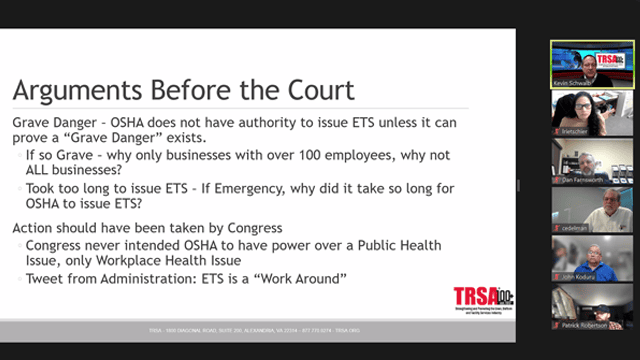OSHA ETS Now in Effect – Despite Supreme Court Challenge

While the U.S. Supreme Court on Jan. 7 begins hearing a challenge to the Occupational Safety and Health Administration’s (OSHA) COVID-19 Emergency Temporary Standard (ETS) on employee vaccinations/testing, the ETS remains in effect – at least for now. Laundry operators with 100 or more employees who aren’t taking steps to comply with the ETS’ vaccination and testing requirements could face fines, and possibly even criminal penalties, said TRSA’s Kevin Schwalb during a one-hour webinar on OSHA’s ETS.
While some states may administer their own federally approved OSHA rules and enforcement, the federal ETS is nonetheless in effect. Despite a court “stay” or delay of the ETS issued on Nov. 7, 2021, the U.S. Circuit Court for the Sixth District reinstated the rule on Dec. 17, 2021. The ETS requires all employers with staffs of 100 or more to have everyone vaccinated against COVID-19 by Jan. 4. Any remaining unvaccinated staff must produce negative test results on a weekly basis. OSHA has said it will defer issuing citations prior to Jan. 10 for noncompliance with the ETS’s provisions – provided that businesses with 100 or more employees are “exercising reasonable, good faith efforts to come into compliance with the standard,” said Schwalb, TRSA’s vice president of government relations. During the Jan. 6 webinar, Schwalb advised against TRSA operator or supplier partners with 100 or more employees waiting until the Supreme Court issues its ETS ruling on Feb. 9. Failing to act on the ETS now could lead to citations and fines. “It is in effect,” Schwalb said of the ETS. “It is the law of the land.”
Fines for “serious” violations of the ETS are $13,653 each. A “willful violation” could draw a penalty of $136,532 per violation. What’s more, if OSHA determines that violations at a worksite are systemic, fines could increase with a “multiplier effect,” Schwalb said, adding that, “They would go up exponentially.”
The 80-plus webinar attendees posed a number of questions about the ETS, such as precisely when a business is considered to have 100 employees. For example, one attendee asked if a company has separate divisions, and one has fewer than 100 people, would both come under the ETS? Schwalb said that if the divisions have the same tax number, OSHA will view them as a single entity for the purposes of ETS enforcement.
Other webinar highlights included Schwalb’s review of:
ETS vaccine and testing requirements: Employers meeting the 100-employee threshold must have documentation to confirm employee vaccinations. These include vaccination cards issued by healthcare authorities or “letters of attestation” from medical or other experts that confirm the person is fully vaccinated. So long as employers exercise due diligence, OSHA won’t hold them accountable for fraudulent documents that appear genuine. Unvaccinated employees must document a negative COVID test every seven days. They also must wear a mask anytime they’re in contact with other employees, aside from meal breaks and a few other exceptions. The ETS permits but doesn’t require employers to pay for COVID testing. However, state or collective-bargaining agreements (CBAs) could in fact require employees to fund testing.
Paid leave to get vaccinated: The ETS requires up to four hours of paid leave for employees to get their vaccinations. As for the side effects of COVID vaccines, OSHA requires “a reasonable amount of time” for paid sick leave, up to two days for a primary dose, excluding booster shots. Again, state rules or CBAs could require additional paid leave time. Employers should check with their legal counsel for rules that apply in their jurisdictions.
Educating employees and penalties for false reporting: Employers must provide staff with information about ETS requirements, as well as workplace policies and procedures related to vaccinations and background on the coronavirus vaccines. This includes the OSHA document “Key Things to Know about COVID-19 Vaccines.” Employers could face severe penalties for retaliating or discriminating against employees regarding the ETS and its vaccination requirements. Similarly, criminal penalties could apply in cases of knowingly supplying false ETS-related statements or documentation to OSHA.
Federal contractors: By Jan. 4, all employees of federal contractors must be 100% vaccinated. That means they’ve received the requisite shots (two for the Pfizer or Moderna vaccines; one for the Johnson & Johnson vaccine), plus two full weeks for inoculations to take effect.
For more information or questions about the ETS, contact Schwalb at kschwalb@trsa.org.
To review sample vaccination policies, state and national executive orders and other industry-specific resources for linen, uniform and facility services customers, employees and others, visit TRSA’s Coronavirus Resource Center at www.trsa.org/covid19.
TRSA offers more than 100 industry-specific programs that provide professional development and training on a range of issues, including regulatory/compliance matters, safety, best practices and strategies for enhancing productivity. Go to www.trsa.org/ondemand to visit TRSA’s On-Demand Learning Portal to view this webinar and more.
